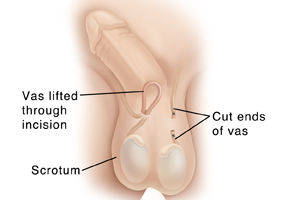Having a Vasectomy: Before, During, and After the Procedure
Having a Vasectomy: Before, During, and After the Procedure
Vasectomy is an outpatient procedure. This means you can go home the same day. It can be done in a doctor’s office, clinic, or hospital. Your doctor will talk with you about how to get ready for surgery. He or she will also discuss the possible risks and complications with you. After the procedure, follow your doctor’s advice for recovery.
Getting ready for surgery
Your doctor will talk with you about getting ready for surgery. You may be asked to do the following:
Sign a consent form. This must be done at least a few days before surgery. It gives your doctor permission to do the procedure. It also states that a vasectomy is not guaranteed to make you sterile.
Don’t take aspirin, ibuprofen, or naproxen for 2 weeks before surgery. These medicines can cause bleeding after the procedure. Also, tell your doctor if you take any medicines, supplements, or herbal remedies.
Tell your doctor if you’ve had any scrotal surgery in the past.
Arrange for an adult family member or friend to give you a ride home after surgery.
Shower and clean your scrotum the day of surgery. Your doctor may also ask you to shave your scrotum.
Bring a jock strap (athletic supporter) or pair of snug cotton briefs to the doctor’s office or hospital.
Eat no more than a light snack before surgery.
During surgery
The entire procedure usually lasts less than 30 minutes.
You’ll be asked to undress and lie on a table.
You may be given medicine to help you relax. To prevent pain during surgery, you’ll be given an injection of pain medicine in your scrotum or lower groin.
Once the area is numb, the doctor makes one or two small incisions in the scrotum. This may be done with a scalpel or with a pointed clamp (no-scalpel method).
The vas deferens are lifted through the incision and cut. The provider seals off the ends of the vas deferens using one of several methods.
If needed, the incision is closed with stitches.
You can rest for a while until you’re ready to go home.
Recovering at home
For about a week, your scrotum may look bruised and slightly swollen. You may also have a small amount of bloody discharge from the incision. This is normal.
To help make your recovery more comfortable, follow the tips below.
Stay off your feet as much as possible for the first 2 days. Try to lie flat on a bed or sofa.
Wear an athletic supporter or snug cotton briefs for support.
Reduce swelling by using an ice pack or bag of frozen peas wrapped in a thin towel. Put the ice pack or towel on your scrotum.
Take medicines with acetaminophen to relieve any discomfort. Don’t use aspirin, ibuprofen, or naproxen.
Wait 48 hours before bathing.
Avoid heavy lifting or exercise for 7 days.
Ask your doctor how long to wait before having sex again. Remember: You must use another form of birth control until you’re completely sterile.
When to seek medical care
Call your doctor if you notice any of the following after surgery:
Increasing pain or swelling in your scrotum
A large black-and-blue area, or a growing lump
Fever or chills
Increasing redness or drainage of the incision
Trouble urinating
Sex after vasectomy
Vasectomy doesn’t change your sexual function. So when you start having sex again, it should feel the same as before. A vasectomy also shouldn’t affect your relationship with your partner. It’s important to remember, though, that you won’t become sterile right away. It will take time before you can have sex without the need for birth control.
Until you’re sterile: After a vasectomy, some active sperm still remain in your semen. It will take time and many ejaculations before the sperm are completely gone. During this period, you must use another birth control method to prevent pregnancy. To make sure no sperm are left in your semen, you’ll need to have one or more semen exams. You usually collect a semen sample at home and bring it to a lab. The sample is then checked under a microscope. You’re sterile only when these samples show no evidence of sperm. Ask your doctor whether additional follow-up is needed.
After you’re sterile: After your doctor tells you you’re sterile, you no longer need to use any form of birth control. You’re free to have sex without the fear of unwanted pregnancy. But a vasectomy does not protect you from sexually transmitted diseases (STDs). If you have more than one sex partner, be sure to practice safer sex by using condoms.
Updated:
March 21, 2017
Reviewed By:
Brown, Kim, APRN,Greenstein, Marc, DO,Image reviewed by StayWell medical illustration team.
